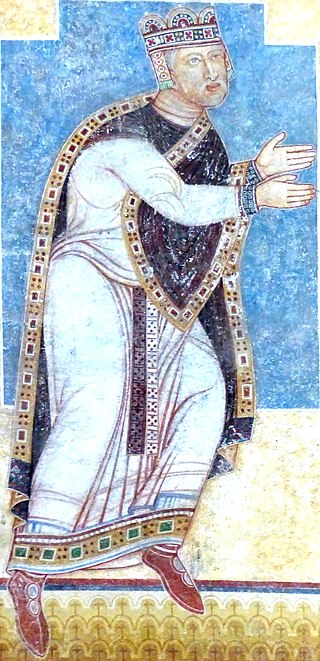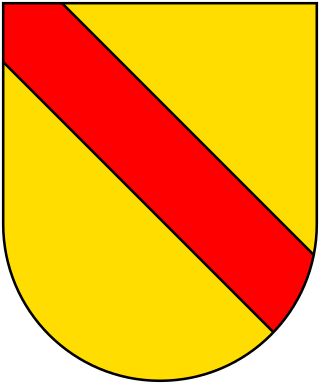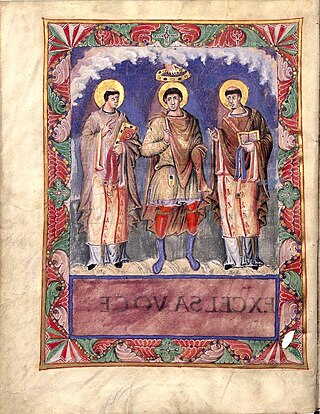Bertulf (or Bartholf or Barthold) (died 883) was the Archbishop of Trier from 869 until his death.
After the Archbishop of Trier Theotgaud was excommunicated by Pope Nicholas I in October 863 in Rome and deposed, and died in Rome in 868, Charles the Bald managed in 869 to have his candidate, Bertulf, appointed as Theotgaud's successor and confirmed by the Pope. Bertulf had previously been abbot of Mettlach. His election ended the long period of sede vacante . Charles also awarded the new archbishop the crown estate of Merzig.
The election of Bertulf was a provocation to Louis the German, who then set up his own candidate. This was Bertulf's brother Waldo, abbot of St. Maximin's Abbey in Trier. Eight years previously, he had been convicted of disloyalty at the Imperial Diet in Regensburg along with his brothers Udo and Berengar and their uncle Ernest, and like them, had been stripped of his offices and titles. His candidacy, however, foundered at the opposition of the other Archbishops.
On 26 September 870, Bertulf attended a synod at Cologne along with the other Rhenish metropolitans, Liutbert and Willibert, and reconsecrated Cologne Cathedral. [1]
Pope Stephen IX was the head of the Catholic Church and ruler of the Papal States from 3 August 1057 to his death in 29 March 1058. He was a member of the Ardenne-Verdun family, who ruled the Duchy of Lorraine, and started his ecclesiastical career as a canon in Liège. He was invited to Rome by Pope Leo IX, who made him chancellor in 1051 and one of three legates to Constantinople in 1054. The failure of their negotiations with Patriarch Michael I Cerularius of Constantinople and Archbishop Leo of Ohrid led to the permanent East–West Schism. He continued as chancellor to the next pope, Victor II, and was elected abbot of the Benedictine monastery of Montecassino.

Year 883 (DCCCLXXXIII) was a common year starting on Tuesday of the Julian calendar.
Theobald of Bec was a Norman archbishop of Canterbury from 1139 to 1161. His exact birth date is unknown. Some time in the late 11th or early 12th century Theobald became a monk at the Abbey of Bec, rising to the position of abbot in 1137. King Stephen of England chose him to be Archbishop of Canterbury in 1138. Canterbury's claim to primacy over the Welsh ecclesiastics was resolved during Theobald's term of office when Pope Eugene III decided in 1148 in Canterbury's favour. Theobald faced challenges to his authority from a subordinate bishop, Henry of Blois, Bishop of Winchester and King Stephen's younger brother, and his relationship with King Stephen was turbulent. On one occasion Stephen forbade him from attending a papal council, but Theobald defied the king, which resulted in the confiscation of his property and temporary exile. Theobald's relations with his cathedral clergy and the monastic houses in his archdiocese were also difficult.

Hincmar, archbishop of Reims, was a Frankish jurist and theologian, as well as the friend, advisor and propagandist of Charles the Bald. He belonged to a noble family of northern Francia.
Teutberga was a queen of Lotharingia by marriage to Lothair II. She was a daughter of Bosonid Boso the Elder and sister of Hucbert, the lay-abbot of St. Maurice's Abbey.
Gunther or Gunthar was Archbishop of Cologne in Germany from 850 until he was excommunicated and deposed in 863.

Baldwin of Luxembourg was the archbishop and elector of Trier and archchancellor of Burgundy from 1307 to his death. From 1328 to 1336, he was the administrator of the archdiocese of Mainz and from 1331 to 1337 of the dioceses of Worms and Speyer. He was one of the most prominent German prelates and statesmen of his age, and the most effective ruler of Trier during the late Middle Ages.
Wilbert was the archbishop of Cologne from 870 until his death.
Theotgaud was the archbishop of Trier from 850 until his deposition in 867. He was the abbot of Mettlach prior to his election in 847 to succeed his uncle, Hetto, as archbishop.
Étienne de Bar, sometimes Stephen of Bar, was a French cardinal and nephew of Pope Calixtus II.
The Conradines or Conradiner were a dynasty of Franconian counts and dukes in the 8th to 11th Century, named after Duke Conrad the Elder and his son King Conrad I of Germany.

Henry V was King of Germany and Holy Roman Emperor, as the fourth and last ruler of the Salian dynasty. He was made co-ruler by his father, Henry IV, in 1098.

Henry IV was Holy Roman Emperor from 1084 to 1105, King of Germany from 1054 to 1105, King of Italy and Burgundy from 1056 to 1105, and Duke of Bavaria from 1052 to 1054. He was the son of Henry III, Holy Roman Emperor—the second monarch of the Salian dynasty—and Agnes of Poitou. After his father's death on 5 October 1056, Henry was placed under his mother's guardianship. She made grants to German aristocrats to secure their support. Unlike her late husband, she could not control the election of the popes, thus the idea of the "liberty of the Church" strengthened during her rule. Taking advantage of her weakness, Archbishop Anno II of Cologne kidnapped Henry in April 1062. He administered Germany until Henry came of age in 1065.

John II of Baden was a titular Margrave of Baden and was Archbishop and Elector of Trier as John II of Baden from 1456 until his death in 1503.

Robert, also spelled Ruotbert or Rotbert, was the archbishop of Trier from 931 until his death. He played a leading role in the politics of both Germany and France, and especially of the Lotharingian territory in between. He was a patron of scholars and writers and a reformer of monasteries.

Adventius was the Bishop of Metz from 855 until his death in 875. He was a prominent figure within the courts of the Carolingian kings Lothar II (855–869) and Charles the Bald (840–877).
The imperial election of 1346 in the Holy Roman Empire was orchestrated by Pope Clement VI after the pope had pronounced the deposition of the Emperor Louis IV. The pope's candidate, Charles of Moravia, was duly elected by five of the imperial electors at Rhense on 11 July.
The Council of Metz of 863 was arranged by Pope Nicholas I to discuss the divorce case of Lothar II, king of Lotharingia, and his wife Theutberga. The council was mainly attended by Lothar II's supporters, and thus concluded the divorce case in his favour; this decision was later overruled by Pope Nicholas I who suspected foul play. It was the fourth and final council called during the reign of Lothar II. No documents from the council survive, but as the council was controversial it is discussed in other medieval sources such as the letters of Pope Nicholas I, the Annals of St Bertin, the Annals of Fulda and the Liber Pontificalis.

Bertram, born Berthold, was a Saxon nobleman, jurist and prelate of the Holy Roman Empire. Praised by contemporaries for his education, his expertise was in Roman law. He was the elected archbishop of Bremen from 1178 until 1179 and the bishop of Metz from 1180 until his death. He was in general a strong supporter of the Staufer emperors, although he was forced into internal exile and temporarily dispossessed of his diocese in 1187–1189. He supported the Staufer in the German throne dispute after 1198.

Arnold II of Isenburg was Archbishop of Trier from 1242 to his death. A long-time member of the cathedral chapter in Trier, he held several provostships before being elected as archbishop, succeeding his uncle Theoderich von Wied. The election was controversial, and king Conrad IV of Germany granted the regalia to Rudolf de Ponte, the opposing candidate, instead. Arnold was confirmed as archbishop by Pope Innocent IV and consecrated in 1245.









